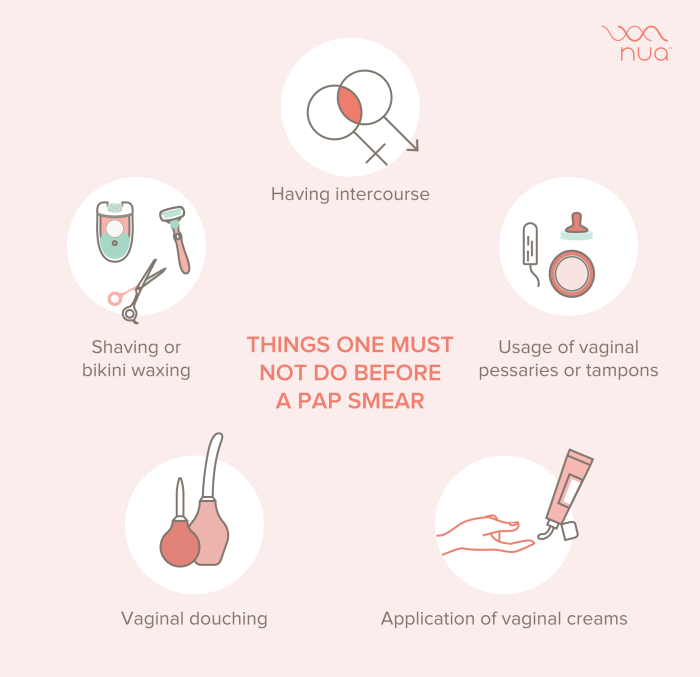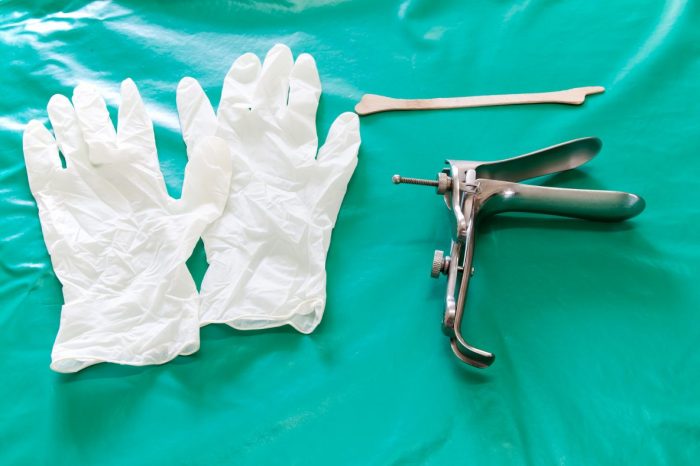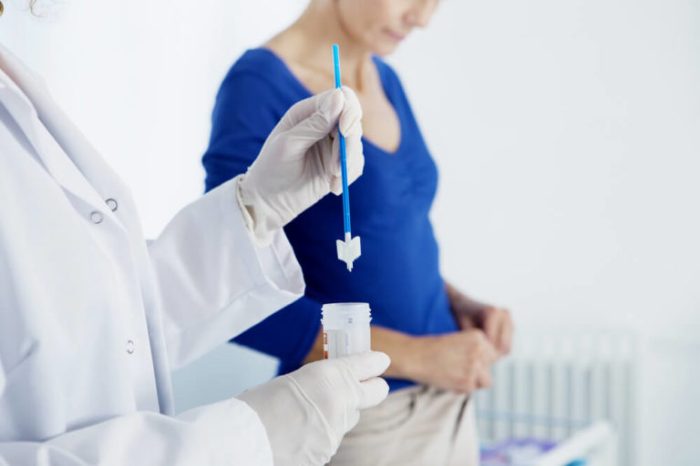Can you have a pap smear while on period – Can you have a pap smear while on your period? It’s a common question with a straightforward answer. Let’s dive into the details and clear up any confusion.
A pap smear is an essential screening test for cervical cancer, and understanding the best time to schedule one is crucial. This article will explore the relationship between pap smears and menstrual cycles, providing clear guidance on when to schedule your appointment for optimal results.
Pap Smear Overview

A pap smear, also known as a Pap test, is a medical procedure that helps detect cervical cancer and other abnormalities in the cervix, the opening of the uterus.
During a pap smear, a healthcare provider uses a small brush or spatula to gently scrape cells from the surface of the cervix. These cells are then examined under a microscope to look for any abnormal changes.
Importance of Regular Pap Smears
Regular pap smears are important for detecting cervical cancer early, when it is most treatable. Cervical cancer is a type of cancer that develops in the cervix, the opening of the uterus. It is the fourth most common cancer among women worldwide.
- Pap smears can help detect cervical cancer at an early stage, when it is most treatable.
- Pap smears can also help detect other abnormalities in the cervix, such as precancerous cells.
- Regular pap smears can help prevent cervical cancer from developing.
Menstrual Cycle and Pap Smears
The menstrual cycle is a complex process involving hormonal changes that affect the female reproductive system. It typically lasts around 28 days, although variations are common. The cycle can be divided into three main phases: the follicular phase, the ovulation phase, and the luteal phase.During
the follicular phase, the levels of the hormone estrogen rise, causing the lining of the uterus (the endometrium) to thicken in preparation for pregnancy. At the same time, a follicle in one of the ovaries matures, containing an egg. When the follicle ruptures, the egg is released into the fallopian tube, marking the ovulation phase.The
In general, it’s not advisable to get a Pap smear during your period. However, if you’re experiencing blood in your urine after radiation therapy for prostate cancer, it’s important to see a doctor as soon as possible to rule out any underlying medical conditions.
Blood in urine after radiation therapy for prostate cancer can be a sign of a serious infection or other complications, so it’s important to get checked out promptly. As for Pap smears, it’s generally best to wait until your period is over to get one.
luteal phase begins after ovulation and lasts until the start of the next period. During this phase, the levels of the hormone progesterone rise, causing the endometrium to become even thicker and more vascularized. If the egg is not fertilized, the levels of estrogen and progesterone fall, causing the endometrium to shed and menstruation to begin.
Changes in the Cervix During the Menstrual Cycle
The cervix, the lower part of the uterus that opens into the vagina, undergoes changes during the menstrual cycle. These changes are influenced by the levels of estrogen and progesterone.During the follicular phase, the cervix is typically firm and closed.
As estrogen levels rise, the cervix begins to soften and open slightly. This allows sperm to enter the uterus during ovulation.After ovulation, the cervix becomes firmer and the opening narrows. This helps to prevent sperm from entering the uterus during the luteal phase.
How Changes in the Cervix May Affect Pap Smear Results
The changes in the cervix during the menstrual cycle can affect the results of a Pap smear. A Pap smear is a test that collects cells from the cervix to check for abnormalities that could indicate cervical cancer.If a Pap smear is performed during the follicular phase, the cervix may be more open and the cells may be easier to collect.
This can result in a more accurate Pap smear result.If a Pap smear is performed during the luteal phase, the cervix may be firmer and the cells may be more difficult to collect. This can result in a less accurate Pap smear result.For
these reasons, it is generally recommended that a Pap smear be performed during the follicular phase of the menstrual cycle, typically between days 10 and 20 after the start of the last period.
Pap Smear During Period: Can You Have A Pap Smear While On Period
It is not advisable to have a pap smear during a period. This is because the presence of menstrual blood can interfere with the accuracy of the test results.
The pap smear is a screening test that is used to detect cervical cancer. It involves collecting cells from the cervix, which is the opening of the uterus. These cells are then examined under a microscope to look for any abnormalities.
Impact of Menstrual Blood on Pap Smear Accuracy, Can you have a pap smear while on period
Menstrual blood can contain a number of substances that can interfere with the pap smear results. These substances can include:
- Red blood cells
- White blood cells
- Mucus
- Bacteria
The presence of these substances can make it difficult to see the cells on the pap smear slide clearly. This can lead to false-negative results, which means that the test does not detect cervical cancer when it is actually present.
Best Time for Pap Smear
To obtain accurate and reliable results, it is crucial to schedule a Pap smear during the optimal time within the menstrual cycle. This timing ensures that the sample collected adequately represents the cells of the cervix, minimizing the likelihood of false-negative results.
While you can’t get a Pap smear during your period, you can still book an appointment for laser hair removal for your Brazilian . Laser hair removal is a great way to reduce hair growth and achieve a smooth, hair-free look.
After your laser hair removal appointment, you can reschedule your Pap smear for a time when you’re not on your period.
The most suitable period for a Pap smear is approximately 10-20 days after the onset of menstruation. During this phase, the cervix is least likely to be affected by hormonal changes or inflammation, which can interfere with cell collection and interpretation.
Scheduling Pap Smears
To schedule a Pap smear effectively, consider the following guidelines:
- Avoid scheduling a Pap smear during or immediately after menstruation, as blood or tissue fragments can contaminate the sample.
- Schedule the Pap smear within the recommended time frame of 10-20 days after the start of your period.
- If you have irregular or unpredictable menstrual cycles, consult with your healthcare provider to determine the most appropriate timing for your Pap smear.
Alternative Methods for Pap Smear Collection
Self-collection kits are an alternative to traditional Pap smear collection by a healthcare provider. These kits allow individuals to collect their own cervical cells at home, which can be more convenient and comfortable for some.
Getting a pap smear while on your period is generally not recommended, as it can affect the accuracy of the test. However, there is a type of cancer that doctors often hesitate to name, the cancer that doctors dont want to call cancer . This cancer is often asymptomatic, making it difficult to detect early on.
Regular pap smears, even while on your period, can help increase the chances of early detection and successful treatment.
Self-Collection Kits
Self-collection kits typically contain a soft brush or swab that is used to collect cells from the cervix. The brush or swab is then placed in a preservative solution and sent to a laboratory for testing. Self-collection kits are generally considered to be as effective as traditional Pap smears in detecting cervical abnormalities.
Advantages of Self-Collection Kits:
- Convenience: Self-collection kits can be done at home, which can be more convenient for individuals with busy schedules or who live in remote areas.
- Comfort: Self-collection kits can be less uncomfortable than traditional Pap smears, as they do not require a speculum to be inserted into the vagina.
- Privacy: Self-collection kits offer more privacy, as individuals can collect their own samples in the comfort of their own homes.
Disadvantages of Self-Collection Kits:
- Accuracy: Self-collection kits may not be as accurate as traditional Pap smears in detecting cervical abnormalities, as the individual may not collect enough cells or may not collect them correctly.
- Interpretation: The interpretation of self-collected Pap smears can be more difficult than traditional Pap smears, as the cells may not be as well-preserved.
- Availability: Self-collection kits may not be available in all areas.
Availability and Accessibility:Self-collection kits are available in many pharmacies and online retailers. They may also be available through some healthcare providers. The availability and accessibility of self-collection kits can vary depending on the location and healthcare system.
Importance of Pap Smear Screening

Regular Pap smear screening is crucial for early detection of cervical cancer, a preventable and treatable disease. Pap smears play a pivotal role in reducing cervical cancer mortality by identifying precancerous or cancerous cells in the cervix before they develop into invasive cancer.
Benefits of Pap Smear Screening
- Early detection:Pap smears enable healthcare providers to detect cervical abnormalities at an early stage, when they are most treatable and curable.
- Reduced mortality:Regular Pap smear screening has been proven to significantly reduce cervical cancer mortality rates. Studies have shown that women who undergo regular screening are up to 90% less likely to develop invasive cervical cancer.
- Prevention:Pap smears not only detect cancer but also identify precancerous cells, allowing for timely intervention and prevention of cancer development.
Frequently Asked Questions
Here are some frequently asked questions about Pap smears during periods, along with their answers:
Accuracy:
- Can a Pap smear be accurate during my period?
Yes, Pap smears can be accurate during your period. However, there may be a slightly higher chance of false-negative results due to the presence of blood in the sample.
Discomfort:
- Will a Pap smear be more painful during my period?
Some women may experience mild discomfort during a Pap smear during their period. This is because the cervix is slightly lower and softer during menstruation.
Scheduling:
- When is the best time to schedule a Pap smear if I have irregular periods?
If you have irregular periods, it’s best to consult with your doctor to determine the best time for your Pap smear.
Patient Education and Resources

Knowledge is empowering when it comes to your health. Here’s a list of valuable resources to help you learn more about pap smears and menstrual cycles:
Online Resources:
- Centers for Disease Control and Prevention: Pap Tests
- American College of Obstetricians and Gynecologists: Pap Smear
- Planned Parenthood: Pap Smear
Support Groups:
Educational Materials:
- CDC: Cervical Cancer Prevention and Early Detection
- ACOG: The Pap Test
- Planned Parenthood: How Do I Prepare for a Pap Smear?
Healthcare Professionals:
For personalized guidance, reach out to:
- Your primary care physician
- Gynecologist or obstetrician-gynecologist
- Local health department
Future Research and Advancements
Ongoing research and advancements in pap smear technology and procedures aim to improve the accuracy, comfort, and accessibility of this crucial screening test.
Non-Invasive Liquid-Based Cytology
Liquid-based cytology (LBC) is an advanced technique that involves collecting cells from the cervix using a brush and preserving them in a liquid solution. This method allows for more accurate analysis of cells, as it reduces the risk of obscuring or missing abnormal cells due to blood or mucus contamination.
LBC has been shown to improve the detection rate of precancerous and cancerous cells, leading to earlier diagnosis and treatment.
Self-Collection Kits
Self-collection kits empower individuals to collect their own pap smear samples in the privacy of their homes. These kits provide clear instructions and all necessary materials, making the process convenient and less invasive. Self-collection kits have the potential to increase screening rates, particularly among underserved populations who may face barriers to accessing traditional pap smear appointments.
Point-of-Care Testing
Point-of-care testing (POCT) devices offer rapid and on-site analysis of pap smear samples. These devices can provide results within minutes, allowing healthcare providers to make informed decisions regarding patient management during the same visit. POCT has the potential to improve the efficiency and accessibility of pap smear screening, especially in remote or resource-limited settings.
Molecular Diagnostics
Molecular diagnostics, such as HPV genotyping and DNA methylation analysis, can provide additional information about the presence and type of HPV infection, which is the primary cause of cervical cancer. These advanced techniques have the potential to enhance the accuracy of pap smear screening by identifying individuals at higher risk of developing cervical cancer and guiding personalized treatment plans.
Final Wrap-Up
In conclusion, while it’s generally not recommended to have a pap smear during your period, it’s essential to prioritize regular screenings for early detection of cervical cancer. By scheduling your pap smear at the right time in your menstrual cycle, you can ensure accurate results and contribute to your overall health and well-being.
Commonly Asked Questions
Can menstrual blood affect pap smear accuracy?
Yes, menstrual blood can dilute the cells collected during a pap smear, potentially affecting the accuracy of the results.
Is it uncomfortable to have a pap smear during my period?
Some women may experience mild discomfort during a pap smear while on their period due to increased cervical sensitivity.
How do I reschedule my pap smear if it falls during my period?
Contact your healthcare provider to reschedule your pap smear for a time when you are not on your period, typically 1-2 weeks after the start of your cycle.






